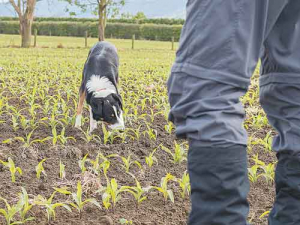Young water science talent recognised
Third-year student Cady Burns has won the Waikato Regional Council Prize in Water Science for 2024.
 Rusty and his handler John Taylor helped to sniff out velvetleaf on eight Waikato farms last month. They will return in late January-early February.
Rusty and his handler John Taylor helped to sniff out velvetleaf on eight Waikato farms last month. They will return in late January-early February.
Landowners and rural contractors are being urged to watch for pest plants.
Warm, humid weather means velvetleaf and other weeds will start appearing on farms, says Waikato Regional Council (WRC).
Helping to sniff out velvetleaf in Waikato last month was Rusty and his handler John Taylor, from Southland. They visited 12 high-risk farms, finding plants sprouting on eight of them. They’ll be back to do more work in late January and early February.
WRC’s biosecurity pest plants team leader Darion Embling says the wet winter and spring has delayed planting by farmers, but crops are now growing and now is the time to watch for and kill pest plants.
“Most farmers have done pre-emergence spraying but we’re hearing from those previously confirmed with velvetleaf infestations that seedlings are pushing through.
“This is a critical time for killing pest plants; hand-pulling seedlings and post-emergence spraying is essential.”
Landowners and rural contractors should look around gateways and the first 3-4 rows of crops for signs of velvetleaf. They can notify WRC for advice to avoid crop loss.
Seedlings are vigorous, with plants left untouched growing rapidly in the first few weeks after germination. Leaves are heart-shaped and velvety to the touch, and have a distinctive smell when crushed.
Velvetleaf grows up to 2.5m tall and has buttery-yellow flowers as it matures from spring to autumn.
This aggressive cropping weed is among the world’s worst. It competes with crops for nutrients, space and water, and its seeds can persist on farms for decades, even surviving digestion and silage.
Farmers and politicians will battle it out at Gisborne this Saturday – on a sports field and all in the name of charity.
People are starting to question the viability of sheep and beef farming as profitability in that sector falls to one of its all-time lows, according to Federated Farmers board member and Gisborne sheep and beef farm, Toby Williams.
Kiwifruit exporter and marketer Zespri has reported a $60 million drop in net profit, mainly driven by reduced licence revenue from lower pricing per hectare than 2022/23.
OPINION: If ever there was a need to look at rural bank lending, then this is it.
The dairy and red meat sectors have welcomed news that New Zealand will begin formal negotiations for a free trade agreement (FTA) with the United Arab Emirates (UAE).
OPINION: Scientists claim to have found a new way to make a substitute for cow's milk that could have a…
OPINION: The Irish have come up with a novel way to measure cow belching, which is said to account for…